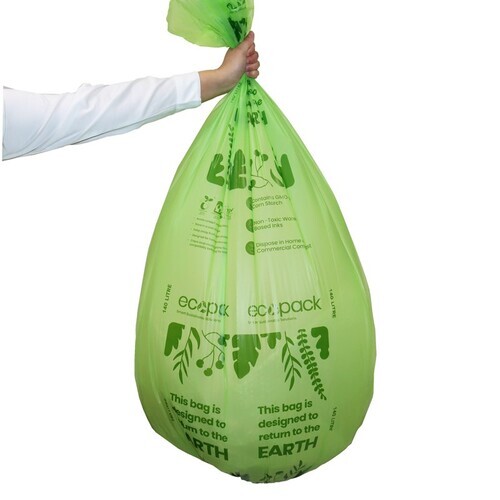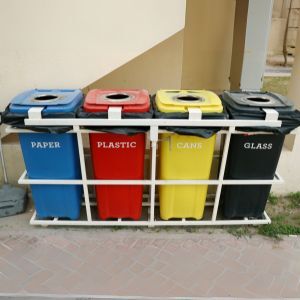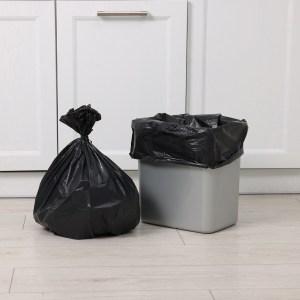Are Black Bin Liners Recyclable? What NZ Businesses Need to Know
Many workplaces and households use black bin liners daily, but their environmental impact is often overlooked. In this blog, we explore whether black bin liners are recyclable, how their colour affects processing, and what sustainable alternatives are available in New Zealand. We'll also share best practices for waste disposal to support greener choices.
The Recycling Dilemma: Black vs Clear Bin Liners
Why Colour Affects Recyclability
Black bin liners are often made from recycled materials, but their dark colour presents challenges for recycling systems. Optical sorting machines, commonly used in recycling plants, struggle to detect black plastic. This can result in black liners being sorted as rubbish, even if the material itself is recyclable.
What Waste Processors in New Zealand Accept
Recycling acceptance varies by region in New Zealand. Currently, no plastic bags are accepted in curbside recycling collections. This applies to all types of plastic bags, including black bin liners, because they create sorting issues in standard recycling facilities. While some commercial waste processors may accept soft plastics through specialised recycling schemes, these services are not yet widely available across the country.
Eco-Friendly Bin Liner Alternatives
Compostable and Biodegradable Options
For businesses aiming to reduce their environmental footprint, switching to compostable or biodegradable bin liners can be a smart and sustainable move. These liners are designed to break down under specific composting conditions, helping divert waste from landfill. However, it’s essential to ensure they are certified for commercial composting in New Zealand and that they are fit for their intended purpose. Compostable bags can be sensitive to moisture and heat, meaning they may start to degrade or fail if used for wet, hot, or heavy waste. Choosing the right bag for the right waste type is crucial to avoid premature breakdown and ensure effective waste containment.
Understanding the Difference: Compostable vs Recyclable
Compostable liners degrade under composting conditions, leaving no toxic residue, while recyclable liners require processing through recycling facilities. Compostable options are ideal for organic waste bins but should never be mixed with soft plastic recycling streams, as this can contaminate the recycling process.
Best Practices for Disposal
Sorting Waste Correctly in Workplaces
Encourage staff to separate waste into general, recyclable, and organic categories. Provide clearly labelled bins and use colour-coded liners to help reinforce correct disposal habits. Training and visual signage can also improve compliance.
Minimising Landfill Waste with Smarter Choices
Switching from black bin liners to lighter coloured or transparent liners can improve recycling outcomes. Opt for planet-friendly materials and consider whether liners are necessary in all bins—some dry waste bins may not require liners at all.
Frequently Asked Questions
Can I recycle any type of bin liner?
Currently, no soft plastics, including any form of bin liner, are accepted through curbside collections. It is essential to check with local processors for specific guidelines, or consider participating in dedicated soft plastic recycling schemes where available.
Are biodegradable liners better than recyclable ones?
Biodegradable liners are ideal for compostable waste, while recyclable liners are better suited to dry, non-organic waste. Choose based on your waste type and disposal method.
What does NZ law say about bin liner materials?
There are currently no specific legal bans or government restrictions on the colour of bin liners in New Zealand. However, government and environmental organisations encourage businesses to minimise plastic use and prioritise more sustainable options such as recyclable or compostable liners wherever possible.
Resource for Smarter Waste Choices
Sustainable Practice Resource
Support sustainable waste practices in your workplace. Read: How Small Changes Can Help You Hit Your Sustainability Targets for tips and insights into making impactful changes.
Conclusion
While black bin liners are commonly used, they pose significant challenges for recyclability in New Zealand. Understanding how colour and material affect waste processing can help businesses make better-informed choices. It’s crucial to consider the entire life cycle and end use of the bags. Since bin liners can only be recycled through specialised soft plastic recycling schemes—which are limited in availability—most end up in landfill along with the rubbish they contain. This means the environmental impact is not just from the bag itself, but also from the way it contributes to landfill volumes and potential contamination of recyclable materials. By switching to clearer options that allow for better waste identification, using compostable alternatives where appropriate, and reassessing whether liners are necessary in every bin, businesses can take meaningful steps towards reducing both their plastic consumption and their landfill contributions.
Posted: Tuesday 8 July 2025


